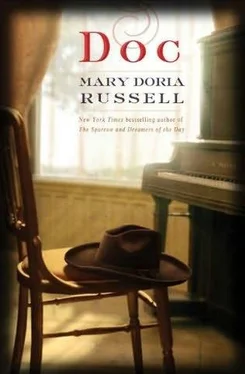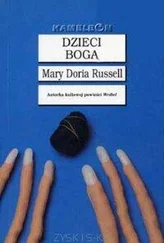Homer sang of boxing matches. Vergil wrote of them. Pindar called down the blessings of Zeus upon them. In paint and in marble and in bronze, on vases and in murals and with heroic statuary, ancient artisans depicted the boxer’s manly beauty, with its cauliflower ears, its honorable scars and blunt, mashed nose.
For millennia, one man had squared off against another on a point of honor or simply to settle a question, here and now, once and for all. Which of us is stronger? Which more fearless and more fearsome? Which of us is the better man? In all that time, empires had risen and flourished and stumbled and failed. Maps of the world had been drawn and redrawn; globes had been invented. Wars and revolutions and science and industry had changed everything—but not boxing. It took the Lilly-McCoy fight to do that.
As a kid, Bat Masterson studied accounts of the match the way better-educated boys read The Iliad . In Bat’s opinion, the fight should have been stopped in the seventy-seventh round, and he was probably right. Even then, long before it was over, McCoy was in bad shape. All the newspapermen agreed about that, and they’d recorded his condition in lascivious detail. Lips grotesquely swollen. Blackened eyes puffed to slits. Broad chest red and slimy with the blood he vomited in quick, efficient gouts during the half-minute rest between the rounds. The darling of Irish immigrants, Tom McCoy would not concede, and swore he’d die before he’d let a fucking Englishman like Christopher Lilly best him. Cocky to the end, McCoy went 119 rounds, surviving a total of two hours and forty-one minutes until—choking on blood, blinded by it, speechless but head up and still defiant—he staggered into the ring from his corner, toed the scratch mark one last time, and fell down, stone-cold dead.
There were other fights that lasted as long or longer, fought by men as good or better, but the Lilly-McCoy event took on a larger meaning the moment Irish Tom died. Chris Lilly was forced to flee the country, skipping out ahead of a manslaughter charge. Eighteen others involved with the contest were arrested, tried, convicted, fined, and jailed.
Freelance scolds seized on boxing as a new source of indignation to fuel America’s rancorous political debates. People who’d never given boxing a thought—ladies and maiden aunties, for the love of Christ!—developed opinions about the sport. Rather than celebrate the victor’s unflagging sledgehammer power and the loser’s astonishing stamina, reformers attacked Lilly as a savage beast who had transformed McCoy’s face from the image of God into a loathsome ruin. The indomitable McCoy became a pitiable, doomed lamb led to the slaughter, and not the roaring, valorous, dying lion he was, refusing to be vanquished even as he was beaten.
Suddenly boxing was a thing to be loathed and done away with, like slavery and alcohol. Abolitionists rammed legislation through in state after state, until the fights were outlawed almost everywhere. “Goddam do-gooder busybodies,” Bat’s father always muttered whenever the subject came up, and it did so often.
Thomas Masterson was a hardworking, law-abiding man who’d never raised a hand in anger, not even against Bat, who might have benefited from a clout across the ear now and then. What Bat’s father couldn’t stand was reformers telling him what to do and think. Following the fights was a way to poke windbag meddlers in the eye. Tom Masterson did so with a boyish glee that he passed on to his sons, and he was not alone.
Across the country, boxing became more popular every year, for the new laws added the thrill of the illicit to the excitement of the sport. Arrangements were negotiated in secret, and word would go out: “A match tonight!” Sometimes the cops would catch wind and show up before the thing was settled, so fight promoters got craftier. Soon entire passenger trains called “Hell on Wheels” could be hired to transport the pugilists and the referees and spectators and bookies and bartenders and whores to a place nobody knew ahead of time. The train would stop in whatever isolated field took the brakeman’s fancy that evening. A ring would be scraped out into the dirt with a boot heel and boxers would put up and toe the line under the stars. Prize money and crowds soared into the thousands.
Then, in 1861, the whole damn country squared off to settle a point of honor, once and for all. It would be the Lilly-McCoy fight on a continental scale: a contest between inflexible, unyielding opponents—savage, bloody, majestic, and pathetic—but not even war could slake the American thirst for bare-knuckle boxing.
Amid the wholesale slaughter of civil convulsion, there was something almost quaint and strangely decent about retail violence. This was bloodletting and brutality with agreed-upon rules, fought by volunteers, not draftees. This was barbarity, but it was barbarity committed with stylish courage, appreciated by men who might be ordered to march anonymously into annihilating cannon fire the next morning. Soldiers expected to die and be buried in impersonal heaps of maimed and mangled meat, but a man could make a name for himself in a boxing match, and be remembered.
Too young for the war, boys like Bat grew up hearing about boxers as famous as any general. Yankee Sullivan, Tom Hyer, John Morrissey, Harry Paulson, “Bill the Butcher” Poole. Stoking interest and boosting sales by pretending to lament the outlawed sport, the popular press covered boxing as far away as Australia. When John Heenan sailed to England to battle Tom Sayers, the whole of red-blooded America cheered him on.
It was the most vicious congregation of roughs that was ever witnessed in a Christian city , Bat read, wishing fervently that he could have been there, betting, snarling, cheering, grunting with every witnessed blow, his own stomach tight in mirrored defense, his fists knotted and jabbing the air. He could imagine it all as he studied the account. What boiled-down savagery, concentrated in so small a space! What rowdyism! What villainy!
What fun!
Bat himself picked more than a few fights as a kid. “Bat’s like a chunk of steel,” his older brother, Ed, would tell folks. “Somebody’s always striking a spark off him.” Trouble was, Bat grew early but he stopped growing early, too. One by one, every boy he knew started to look down at him, and something about that made him even more eager to mix it up, readier than ever to teach larger, stronger, heavier kids a lesson.
Instead, he himself started learning lessons, and it wasn’t long before young Bat Masterson knew two important things for sure. First off, to box well, you need more than combativeness. You need size and power, stamina and strategy. From the age of twelve, Bat was always fighting out of his class. Unless he wanted to end up like Irish Tom McCoy, dead on his feet in the 119th, he would need a way to even things up.
The second thing he knew for sure was this. Farming is a sucker’s game. You can work like an ox—put everything you’ve got into the land—but if the weather doesn’t break you, the markets will. You want to gamble with stakes like that? You’re better off playing cards. You can still lose everything, but at least you don’t work so damn hard for the privilege, and you by God dress up nice for the occasion.
Which is why, before he turned fifteen, he was determined to run away from home. “Ed,” he told his older brother, “you can stay here and stare at a mule’s ass end if you like, but me? I ain’t never gonna plow another field as long as I live.”
Within a few weeks of leaving, Bat was carrying a frontier equalizer: the big old Navy Colt he won off a drunk in a card game. Over the next ten years, to the line “plowboy” on his résumé, he added buffalo hunter, army scout, professional gambler, city police officer, county sheriff, and saloon owner. In 1907, when he wrote his autobiography, he would extend the list to include “genius with firearms,” “a born captain of men,” “generous to the last dollar.” He decided to leave out “becomingly modest” and “the soul of Christian humility.” That might have carried the joke too far.
Читать дальше












